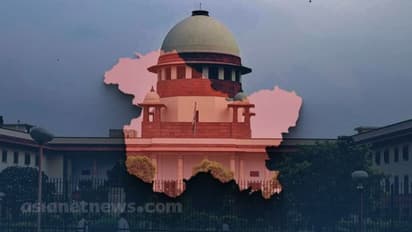#NayaJammuKashmir trends as SC upholds abrogation of Article 370, calls for polls by September 2024

Synopsis
Article 370 verdict: Chief Justice of India DY Chandrachud, articulating the judgment alongside Justices Gavai and Surya Kant, underscored Article 370's temporary nature and asserted the president's authority to revoke it.
The hashtag #NayaJammuKashmir gained traction across social media, particularly in X, following the Supreme Court's recent ruling upholding the Centre's decision to revoke Article 370, which had granted special status to the former state of Jammu and Kashmir.
Chief Justice of India DY Chandrachud, articulating the judgment alongside Justices Gavai and Surya Kant, underscored Article 370's temporary nature and asserted the president's authority to revoke it.
Article 370 verdict: Supreme Court upholds reorganisation of Ladakh as Union Territory
Here are a few tweets:
The Supreme Court's validation serves as a political boost for Prime Minister Narendra Modi and his Bharatiya Janata Party (BJP) ahead of the upcoming national elections. The erstwhile state of Jammu and Kashmir, India's only Muslim-majority region, lost its special status in August 2019 under Article 370, subsequent to the BJP's landslide victory in elections and the implementation of a significant electoral promise by the prime minister.
Supreme Court upholds abrogation of Article 370 in landmark verdict
The legal proceedings encompassed petitions contesting legislative and executive orders aimed at nullifying the special status of the former state of Jammu and Kashmir, dividing it into union territories, including Ladakh. Following the abrogation, the Jammu and Kashmir administration enforced restrictions on movement, internet access, and detained local political figures.
Article 370 conferred substantial autonomy to Jammu and Kashmir while limiting the Centre's jurisdiction to domains such as finance, defence, foreign affairs, and communications. Its revocation in 2019 initiated debates regarding its constitutional validity and the subsequent ramifications.
Introduced in 1954 through a presidential order under Article 370, Article 35A empowered the Jammu and Kashmir legislature to delineate permanent residents, imposing strict constraints on non-residents, prohibiting land ownership, government employment, and educational scholarships within the region.
After the annulment of Article 370, the region underwent a reorganization, transitioning into two Union Territories—Ladakh and Jammu and Kashmir. While Ladakh emerged as a Union Territory without a legislature, Jammu and Kashmir retained its legislative assembly.
Stay updated with the Breaking News Today and Latest News from across India and around the world. Get real-time updates, in-depth analysis, and comprehensive coverage of India News, World News, Indian Defence News, Kerala News, and Karnataka News. From politics to current affairs, follow every major story as it unfolds. Get real-time updates from IMD on major cities weather forecasts, including Rain alerts, Cyclone warnings, and temperature trends. Download the Asianet News Official App from the Android Play Store and iPhone App Store for accurate and timely news updates anytime, anywhere.